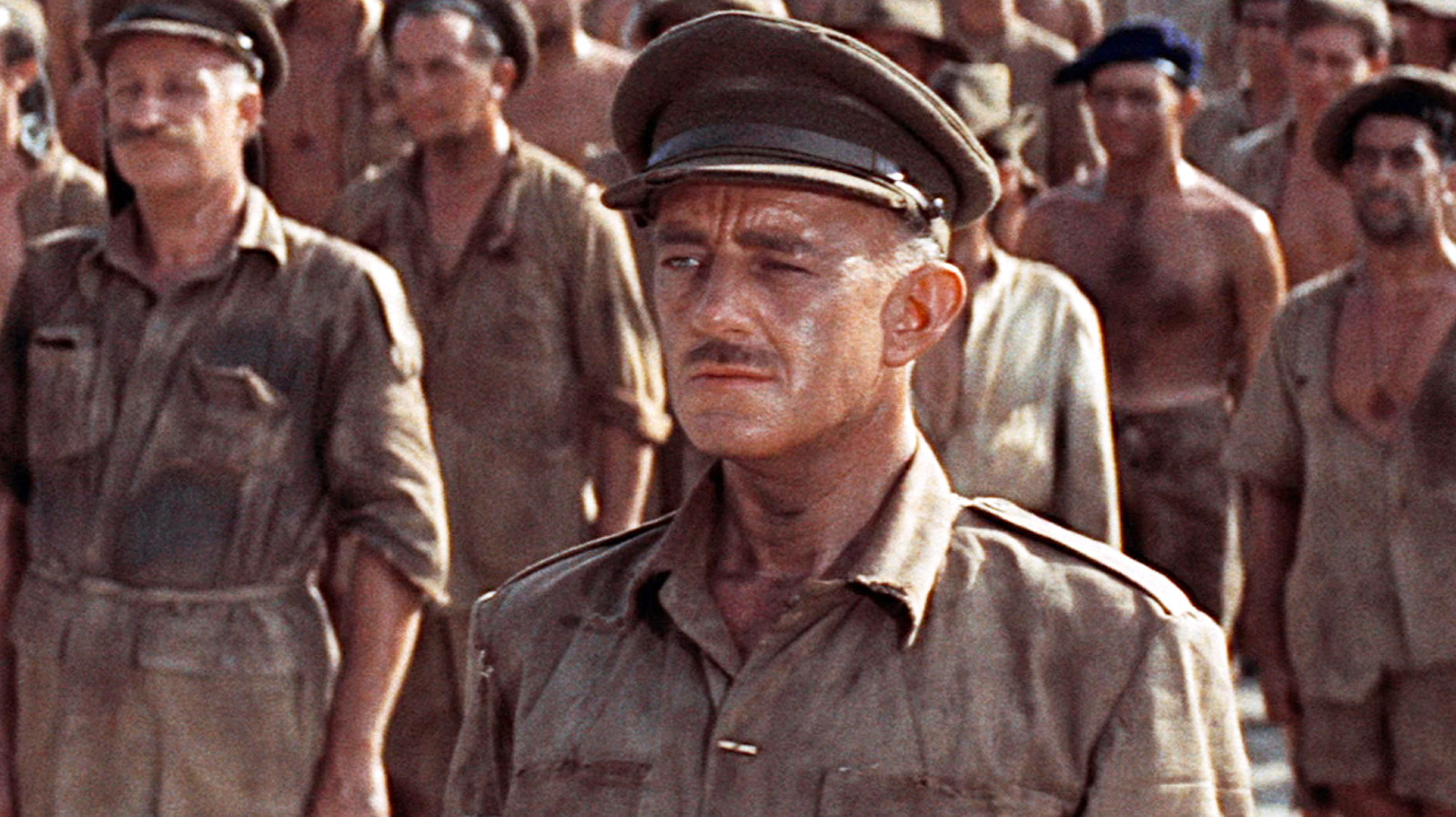Have you ever wondered what it would be like to be caught in the middle of a brutal war, forced to work on a project of immense strategic importance under the watchful eyes of your captors? The 1957 film “The Bridge on the River Kwai” paints a vivid and unforgettable picture of such a scenario, exploring themes of survival, resilience, and the complexities of human nature amidst the horrors of war.

Image: www.themoviedb.org
Based on the 1952 novel of the same name by Pierre Boulle, “The Bridge on the River Kwai” tells the story of British prisoners of war held captive by the Japanese during World War II. Their harrowing task is to build a railway bridge across the Kwai River – a bridge vital for the Japanese military’s logistical efforts. As the prisoners struggle to survive the harsh conditions and the brutal treatment of their captors, they find themselves caught in a web of conflicting loyalties and ideologies. The film explores the psychological and moral dilemmas faced by individuals in such an extraordinary situation, ultimately offering a timeless reflection on the human condition.
A Tale of Two Worlds: The Bridge as a Symbol of Conflict
The bridge on the River Kwai, a symbol of human engineering and ambition, becomes a potent focal point for the film’s themes. It represents the clash between two distinct worlds – the disciplined and ordered British military, and the ruthless and disciplined Japanese forces. The bridge becomes a metaphor for the complex interplay between cooperation and resistance, between the pursuit of duty and the struggle for survival.
The Unlikely Hero: Colonel Nicholson and the Quest for Dignity
The film’s protagonist, Colonel Nicholson, played by the iconic Alec Guinness, embodies the quintessential “stiff upper lip” British officer. He is initially steadfast in his commitment to his duty, refusing to cooperate with the Japanese or compromise his principles. He believes in upholding British military standards, even in the face of adversity. He sees the bridge project as an opportunity to demonstrate his honor and restore the dignity of his men. Nicholson’s rigid adherence to rules and regulations, however, ultimately leads to tragic consequences.
The Shadow of War: Exploring the Depths of Human Nature
While Nicholson embodies the British perspective, the film also delves into the Japanese mindset, exploring the complexities of their cultural code and the brutality of their wartime tactics. The character of Saito, the Japanese Commander played by Sessue Hayakawa, represents a contrasting approach to authority. Saito is a man of honor bound by his own code, yet fiercely determined to complete the bridge project at any cost. His unwavering commitment to his mission creates a volatile dynamic that drives the plot. “The Bridge on the River Kwai” doesn’t shy away from portraying the harsh realities of war, the pervasive fear, and the psychological toll it takes on individuals on both sides.

Image: www.slashfilm.com
The Price of War: A Moment of Truth
As the bridge nears completion, a pivotal moment arrives. The film’s central conflict explodes into a deadly climax, highlighting the consequences of misplaced pride and the tragedy of war. The bridge, a symbol of human ingenuity and determination, becomes a devastating symbol of the destructiveness of war. “The Bridge on the River Kwai” forces us to confront the tragic irony of the situation; building a bridge for strategic advantage, ultimately leading to its destruction and the loss of countless lives.
Beyond the Bridge: Legacy and Interpretation
“The Bridge on the River Kwai” is more than just a war film; it’s a powerful meditation on the nature of war and its impact on human relationships. The film’s haunting ending leaves a lasting impression, prompting viewers to contemplate the complexities of honor, duty, and the enduring spirit of humanity in the face of adversity.
A timeless Classic: Still Relevant Today
Even decades after its release, “The Bridge on the River Kwai” remains a timeless classic, its themes and characters resonating with audiences across generations. The film continues to be relevant today, offering powerful insights into the enduring human struggle for dignity, survival, and the search for meaning amidst the chaos of war. It serves as a reminder of the profound impact of conflict on individuals and societies, and the delicate balance between loyalty and compassion in times of crisis.
Why You Should Watch “The Bridge on the River Kwai”
If you haven’t seen this film yet, now is the perfect time to experience its captivating narrative and iconic performances. Here’s why it’s a must-watch:
- Historical Significance: It offers a unique glimpse into a crucial period of World War II and the realities of war, including the psychological and moral implications of conflict.
- Themes of Conflict and Reconciliation: The film explores the complexities of human nature, the struggle for survival, and the potential for redemption in the face of adversity.
- Iconic Performances: Alec Guinness and Sessue Hayakawa deliver unforgettable performances, creating characters that are both sympathetic and complex.
- Timeless Story: The film’s themes remain relevant today, prompting reflection on the enduring human spirit and the power of resilience even in the face of unimaginable challenges.
Bridge On River Kwai Full Movie
https://youtube.com/watch?v=HP0eTBMNJBs
Conclusion: Beyond the Bridge, a Human Story
“The Bridge on the River Kwai” stands as a powerful testament to the human capacity for endurance and the enduring power of the human spirit in the face of adversity. The film transcends the boundaries of a war story, offering a profound meditation on the nature of war itself and the complicated choices we face within its confines. Beyond the bridge, The Bridge on the River Kwai represents a timeless narrative that continues to capture the imagination and inspire contemplation even today.





